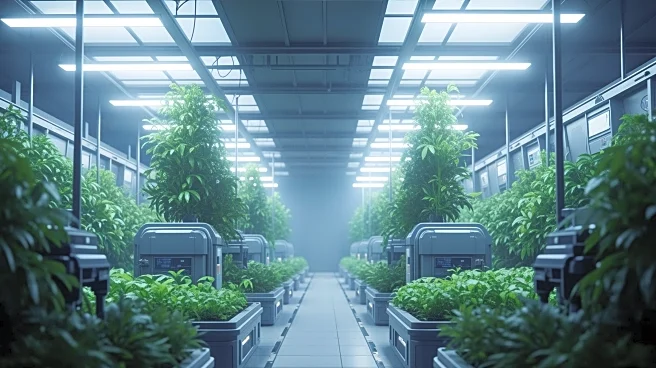What's Happening?
The agricultural biotechnology market is projected to grow significantly, from USD 92.19 billion in 2025 to USD 144.25 billion by 2030, at a compound annual growth rate (CAGR) of 9.4%. This growth is driven
by the urgent need for sustainable food sources, climate resilience, and efficient resource use as the global population approaches 10 billion by 2050. Biotechnology is increasingly seen as a solution, with advances in genetic engineering, microbial applications, and animal biotechnology enhancing productivity and sustainability across the agricultural supply chain. Key developments include the adoption of genetically modified crops, bio-based pest control, and microbial soil enhancers, which reduce chemical dependence and improve resilience against climate-related stresses.
Why It's Important?
The expansion of the agricultural biotechnology market is crucial for addressing the challenges of food security and environmental sustainability. As the demand for food increases, biotechnology offers innovative solutions to enhance crop yields and livestock productivity while minimizing environmental impact. The adoption of technologies such as CRISPR-based genome editing and microbial biofertilizers supports eco-friendly agricultural practices. This growth benefits farmers and agribusinesses by providing tools to improve efficiency and resilience, while also supporting global efforts to combat climate change. The market's expansion is also likely to drive economic growth, particularly in regions like North America, which leads in biotechnology innovation.
What's Next?
North America is expected to maintain its leadership in the agricultural biotechnology market, supported by advanced research and development infrastructure and favorable regulatory frameworks. The region's dominance is bolstered by major industry players investing in next-generation genetic and microbial technologies. As precision agriculture and AI-driven biotechnologies gain traction, productivity and sustainability outcomes are expected to improve. The focus on climate-resilient farming and sustainable food systems will likely continue to drive innovation and market growth, with significant implications for global food security and environmental sustainability.
Beyond the Headlines
The growth of the agricultural biotechnology market also raises ethical and regulatory considerations. The increasing use of genetic engineering and synthetic biology in agriculture necessitates robust biosafety measures and public engagement to address potential concerns about genetically modified organisms (GMOs) and their impact on ecosystems. Additionally, the shift towards biotechnology-based solutions may influence global trade dynamics, as countries with advanced biotech capabilities could gain competitive advantages in agricultural exports. These developments underscore the need for international cooperation and regulatory harmonization to ensure the safe and equitable deployment of biotechnology innovations.










